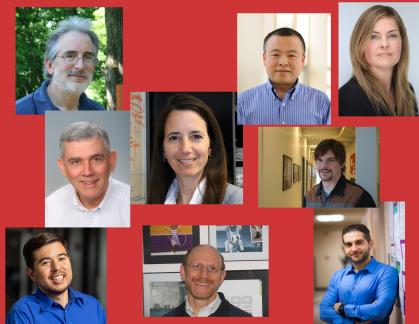Rutgers Researchers Awarded $3M Grant from NSF for Research Traineeship for Robotics of the Future to Improve Quality of Life
A new group of socially-cognizant roboticists will emerge from Rutgers, The State University of New Jersey thanks to a $3M National Science Foundation Research Traineeship (NRT) grant. Two years in the making, this first major traineeship grant awarded to the Rutgers School of Engineering will equip researchers and graduate students with insightful research that integrates technology domains of robotics, computer vision and machine learning with social and behavioral sciences including psychology, cognitive science, and urban policy planning.
The training program, called Socially Cognizant Robotics for a Technology Enhanced Society (SOCRATES), is being led by Kristin Dana, professor of electrical and computer engineering, School of Engineering, who has assembled an interdisciplinary team of faculty spanning five departments and three schools within Rutgers University. The core team is comprised of:
Kristin Dana, PI, professor of electrical and computer engineering, School of Engineering;
Kostas Bekris, co-PI, associate professor, computer science department, School of Arts and Sciences;
Clinton Andrews, co-PI, professor of urban planning and associate dean for research, Edward J. Bloustein School of Planning and Public Policy;
Jacob Feldman, co-PI, professor of psychology and cognitive science, School of Arts and Sciences;
Jingang Yi, co-PI, professor of mechanical and aerospace engineering, School of Engineering
Pernille Hemmer, associate professor of Psychology and Cognitive Science, School of Arts and Sciences;
Aaron Mazzeo, associate professor of mechanical and aerospace engineering, School of Engineering;
Hal Salzman, professor of planning and public policy, Edward J. Bloustein School of Planning and Public Policy;
Matthew Stone, professor and department chair of computer science, School of Arts and Sciences;
Kathy Haynie, director of Haynie Research and Evaluation and the team’s external evaluator on STEM education.

The traineeship program will focus on semi-automated systems capable of performing daily life through the Robotics for Everyday Augmented Living (REAL) program, and is expecting to train a cohort of over 35 graduate students (MS and PhD) across the academic units of Engineering, Computer Science, Behavioral Sciences, and Public Policy. Trainees will engage in fundamental research to understand and model the social dimensions of robot deployments and advance the long-term goal of dignified living and working in a technologically enhanced society.
“The students may come from a technology background or from a social science background for this unified training of interdisciplinary skills. We are at a point in technology where robotics may soon be part of everyday life and work but we want robots to be developed in a way that they can adapt to human needs and desires, rather than the other way around,” said Dana. “That includes working with societal impact for which we need to train socially cognizant roboticists. This new kind of roboticist is a convergence of socially-aware technologists and technology-aware social scientists.”
The participants will be trained in technology that includes technology for building and controlling robots, collecting, and learning from large data sets; designing socially-cognizant systems through cognitive science, and planning for a positive societal impact while mitigating unintended consequences.
With plans of using the university campus as a living lab environment, Dana added, “We hope to do experiments using our Rutgers Robotics Live Lab with key application domains like strength and mobility, recycling and trash collection, food preparation and smart buildings.
An important program objective is the recruitment and retention of diverse trainees through a multi-faceted approach, including a student-led robotics club that focuses on a novice-to-expert (N2E) strategy to motivate and help students who want to learn disciplines robotics but have no prior experience. This concept was used in the Rutgers N2E Coding Club that Prof. Dana helped to start with her graduate student Parneet Kaur. By taking the intimidation factor out of learning a new coding skill, the N2E student-led modules are welcoming to beginners and encourage participation. The NRT recruitment strategy will also include a Faculty Talk-it-up Robotics Series for recruiting underrepresented populations. The program will also coordinate internships that are aligned with changing workforce and research needs.
Dana and her team worked on their SOCRATES proposal for two years. It started with an exchange of ideas to develop a project that “needed to be truly interesting, something to be passionate about so they would be willing to take a chance in pursuing such a competitive proposal. We assembled an excellent and unified team, and had an incredible mentor Eileen Kowler who helped in every stage of the proposal,” Dana described. Dana emphasized the value of this female-to-female mentorship. “It is very important that women take their place at the table. I am lucky to have a team that I did not have to fight to have my ideas heard but certainly I hope that my presence and Pernille Hemmer’s helps to demystify success and to set this example to others.”
An expected total of approximately 100 students will benefit from some component of the program over the next five years.



